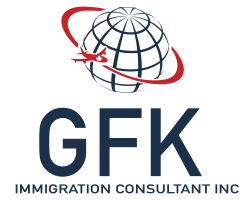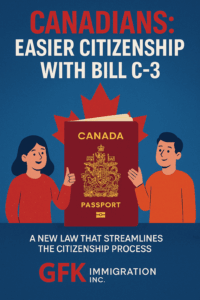Canadians Easier citizenship with Bill C-3
The Canadian government introduced Bill C-3, a transformative piece of legislation aimed at easing citizenship eligibility by descent rules.
Announced by the Honourable Lena Metlege Diab, Minister of Immigration, Refugees, and Citizenship, this bill seeks to eliminate barriers for Canadians born abroad.
This bill aims to ensure that they can pass citizenship to their children and address historical inequities for “Lost Canadians.”
Table of Contents
A Fairer Path to Canada’s Citizenship
The current Citizenship Act limits citizenship by descent to the first generation born abroad, meaning Canadians who were born outside Canada and acquired citizenship through descent cannot pass it on to their children born abroad.
This restriction, introduced in 2009, has left many families feeling disconnected from their Canadian heritage.
Bill C-3, introduced on June 05, 2025, proposes significant changes to make the citizenship process more inclusive and reflective of modern Canadian families living both in Canada and globally.
The legislation responds to a 2023 Ontario Superior Court ruling that declared key provisions of the first-generation limit unconstitutional, prompting the government to act swiftly.
Key Changes in Bill C-3 For Canadian Citizenship
Introduced on June 05, 2025, Bill C-3, An Act to Amend the Citizenship Act (2025), proposes sweeping changes to address these issues and align Canada’s citizenship framework with its inclusive values.
The legislation aims to restore citizenship to those affected by historical and current restrictions while creating a forward-looking system that supports Canadians living abroad.
Here are the key components of the bill:
-
- Automatic Citizenship for Affected Individuals: Bill C-3 will automatically grant citizenship to anyone who would be a citizen today but for the first-generation limit or outdated provisions in previous citizenship legislation.
- This includes individuals born abroad to Canadian parents in the second or subsequent generations, as well as those affected by historical rules that stripped citizenship, such as the former section 8 of the Citizenship Act.
- This provision is expected to benefit thousands of individuals and their families, restoring their rightful connection to Canada.
- Automatic Citizenship for Affected Individuals: Bill C-3 will automatically grant citizenship to anyone who would be a citizen today but for the first-generation limit or outdated provisions in previous citizenship legislation.
-
- New Framework for Citizenship by Descent: The bill introduces a new framework allowing Canadian parents born abroad to pass citizenship to their children born or adopted outside Canada, provided they demonstrate a “substantial connection” to Canada.
- This connection is defined as a cumulative 1,095 days (approximately three years) of physical presence in Canada before the child’s birth or adoption.
- This requirement ensures that citizenship remains tied to a meaningful link to Canada while offering flexibility for families living abroad.
- New Framework for Citizenship by Descent: The bill introduces a new framework allowing Canadian parents born abroad to pass citizenship to their children born or adopted outside Canada, provided they demonstrate a “substantial connection” to Canada.
-
- Support for Adopted Children: For Canadians born abroad who meet the substantial connection test, Bill C-3 extends access to direct grants of citizenship for children adopted outside Canada.
- This change addresses a significant gap in the current system, where adoptive parents born abroad through descent were unable to secure citizenship for their children without navigating complex immigration pathways.
- Restoring Citizenship for “Lost Canadians”: The term “Lost Canadians” refers to individuals who lost or never acquired citizenship due to outdated provisions in Canada’s citizenship laws, particularly those in effect before 2009.
- While amendments in 2009 and 2015 resolved many cases, some individuals and their descendants remained excluded.
- Bill C-3 aims to close these gaps, restoring citizenship to remaining “Lost Canadians” and their families, including those impacted by the former section 8, which required certain individuals to apply to retain citizenship by age 28 or risk losing it.
- Support for Adopted Children: For Canadians born abroad who meet the substantial connection test, Bill C-3 extends access to direct grants of citizenship for children adopted outside Canada.
Why This Matters: A Step Toward Inclusion
The first-generation limit has long been a point of contention, as it has prevented many Canadians from passing on their citizenship, creating a sense of exclusion for families living abroad.
Bill C-3 reflects Canada’s commitment to fairness, inclusivity, and the values that define the nation.
As Minister Diab emphasized, “Canadian citizenship is at the heart of our identity. This legislation ensures that it reflects the realities of our globalized world and supports families wherever they choose to live.”
The changes are particularly significant in light of the 2023 Ontario Superior Court ruling, which highlighted the unconstitutional nature of the current restrictions.
By addressing these issues, the government is not only complying with the court’s decision but also reinforcing the country’s reputation as a welcoming and inclusive nation.
Discussions have shown a mix of enthusiasm and curiosity about the reforms, with many praising the move toward inclusivity, though some express concerns about the practicalities of implementation, such as processing times and documentation requirements.
Historical Context: The “Lost Canadians” Saga
The issue of “Lost Canadians” has been a recurring theme in citizenship history.
Before 2009, certain provisions in the Citizenship Act led to the loss of citizenship for individuals born abroad or those who failed to meet specific retention requirements.
For example, under the former section 8, individuals born abroad to Canadian parents before 1977 were required to apply to retain citizenship by age 28, or they would lose it.
Many were unaware of this requirement, resulting in the loss of their Canadian status.
Legislative changes in 2009 and 2015 addressed many of these cases, restoring citizenship to thousands.
However, gaps remained, particularly for those born abroad in the second or subsequent generations and those affected by other obscure provisions.
Bill C-3 builds on these earlier reforms, ensuring that all “Lost Canadians” and their descendants are included in the citizenship framework.
What Happens Next?
If Bill C-3 passes both Houses of Parliament and receives Royal Assent, Immigration, Refugees and Citizenship Canada (IRCC) will work diligently to implement the changes as quickly as possible.
Eligible individuals will find comprehensive guidance on the IRCC website, including details on how to apply for citizenship or confirm their status under the new rules.
In the interim, measures are available for those affected by the first-generation limit, with more information provided on IRCC’s website.
The government has emphasized its commitment to transparency and accessibility, recognizing that many families will have questions about how the changes apply to them.
IRCC plans to roll out resources, including FAQs and application guides, to assist those navigating the new system.
Bill C-3 represents a pivotal moment in the citizenship journey, addressing longstanding inequities and ensuring that citizenship remains a unifying force for Canadians worldwide.
By removing the first-generation limit and restoring citizenship for many lost citizens, the government is fostering a sense of belonging that transcends borders.
This legislation not only honors the Canadian commitment to fairness but also strengthens its position as a global leader in inclusive immigration policies.
For the latest updates on Bill C-3 and its progress through Parliament, visit the IRCC website or follow trusted sources like INC News for expert analysis and insights.
What are the 4 requirements to become a Canadian citizen?
To become a Canadian citizen, you must:
1. Be a permanent resident.
2. Have lived in Canada for at least 1,095 days (3 years) in the past 5 years.
3. File income taxes, if required.
4. Pass a citizenship test and demonstrate language proficiency (if aged 18-54).
What is the 28-year rule in Canada?
The “28-year rule” refers to a repealed provision (former section 8 of the Citizenship Act) that required Canadians born abroad before 1977 to apply to retain citizenship by age 28 or lose it. Bill C-3 (2025) aims to restore citizenship for those affected.
How many years does it take to get Canadian citizenship?
You must live in Canada as a permanent resident for at least 1,095 days (approximately 3 years) within the 5 years before applying. Processing times vary but typically take 12-24 months.
GFK Immigration
Gboyega Esan RCIC R708591
Phone: +1 (647) 225-0092
#CanadaPR #Saskatchewan #GFKImmigrationExperts #studyincanada #Steinbach #canada #Alberta #studyinaustralia #ielts #studentvisa #studyinusa #studyvisa #immigration #canadavisa #visa #education #internationalstudents #overseaseducation #study #canadaimmigration #ExpressEntry

